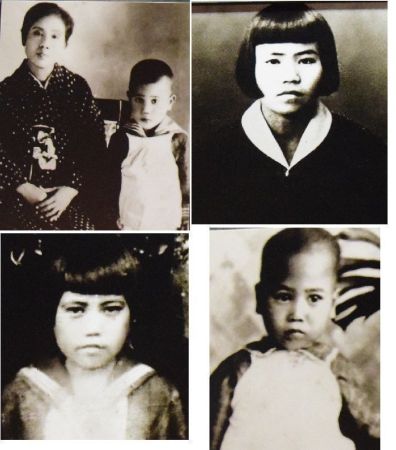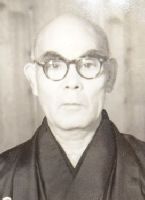Diary of mayor who lost wife and four children in Tsushima Maru sinking is published

Photos of Motohide Tonaki’s wife Fusa, children Genzo (top left), Hideko (top right), Kazuko (bottom left) and Kojun are on display at the Tsushima Maru Memorial Museum.
August 21, 2020 Ryukyu Shimpo
By Reiko Akamine
Aug 22, 2020 marks 76 years to the day since Tsushima Maru, a passenger/cargo ship carrying children and civilian evacuees out of Okinawa, was sunk by an American submarine during WWII. While the number of living survivors and bereaved families has shrunk over the years, a diary offering insights into the sentiments of a grieving husband was made available to the public for the first time. The Battle of Okinawa in Nanjo-shi: The Archives was published by the Nanjo City Board of Education in March this year, and includes excerpts from a diary kept by Motohide Tonaki, who was the mayor of Sashiki Village after the war (Tonaki passed away in 1972.) Tonaki lost his wife and four children in the sinking of Tsushima Maru and wrote in one entry: “I made the greatest irreparable mistake of my lifetime.”
Nanjo-shi’s historical records specialist, Yuki Yamauchi, was an editor for The Battle of Okinawa in Nanjo-shi: The Archives. Yamauchi commented, “The diary is an invaluable document, as the entries were written in real-time. It tells us what the bereaved families were feeling about the incident at the time.” Tonaki’s diary begins in March 1944, and ends on May 2, 1945, during the Battle of Okinawa. The publication only contains experts from his diary pertaining to the Tsushima Maru incident.

Motohide Tonaki
Tonaki first mentions the Tsushima Maru in a journal entry made on July 20, 1944. It was after the annihilation of the Japanese Army in Saipan, and the U.S. troops’ landing on Okinawa was imminent. The national and prefectural governments began evacuating the women, children, and the elderly out of Okinawa. Tonaki, who was a prefectural government employee at the time, obligingly evacuated his wife and children.
In an Aug 19 entry, Tonaki wrote that he obtained the transfer documents and certificates required to evacuate his wife and children. Next to the main entry, the words “mistake of a lifetime” are jotted down. It appears Tonaki added the remorseful note later when he learned of the unfortunate fate of the ship.
The Tsushima Maru departed on Aug 21, with Tonaki’s wife and four children on board. Tonaki’s journal entry on Aug 22 provides a glimpse into the loneliness he felt after sending off his family: “The house is quiet as if a fire has gone out.” The Tsushima Maru was sunk that night.
Tonaki appears to have heard the rumor on Aug 25 or 26 that the Tsushima Maru was shipwrecked. In September he noted: “seems to be few casualties,” then “159 dead,” and “confidential information,” evidencing the mix of information he received. The diary indicates he attempted to gather information about his family. When Tonaki finally learned that his wife and four children were not among the survivors, he wrote the word “despair” in his journal. Later, he documented how he organized their belongings and how often his friends and family visited. Tonaki also detailed how he went to the docks to welcome back the spirits of his family from the sea, as their remains were not recovered. Tonaki’s diary provides valuable insights into his life following the Tsushima Maru incident.
Akiko Yamashiro, a Nanjo-shi historical records specialist commented, “Official documents rarely provide insights into how people thought and spent their days. We can see from Tonaki’s diary that the bereaved tried to carry on with their wounds. It’s a historical record that enables us to feel their lives and emotions.”
According to the specialists of Nanjo-shi’s historical records, the former Sashiki City records department created a transcript of Tonaki’s journal and held the records in safekeeping. However, the whereabouts of Tonaki’s original diary is currently unknown.
(English translation by T&CT and Monica Shingaki)
Previous Article:Eleven rushed to hospital after box jellyfish stings, possibly related to coronavirus beach closures
Next Article:Tokyo Bus to launch two new routes in Okinawa, connecting central areas such as the Airport and Naha to the southern regions, claim they are taking a “long-term view” with regards to COVID-19
[Similar Articles]
- Memorial service held for victims of Tsushima-Maru tragedy
- Seven names added to Tsushima-maru victims list after 68 years
- Three hundred fifty people attend memorial service for victims of Tsushima-Maru tragedy
- Tonaki Island holds children’s annual water sports festival
- Tonaki Village Council protests against parts of US Marine helicopter falling near Tonaki
 Webcam(Kokusai Street)
Webcam(Kokusai Street)


